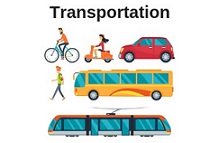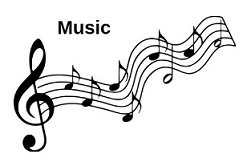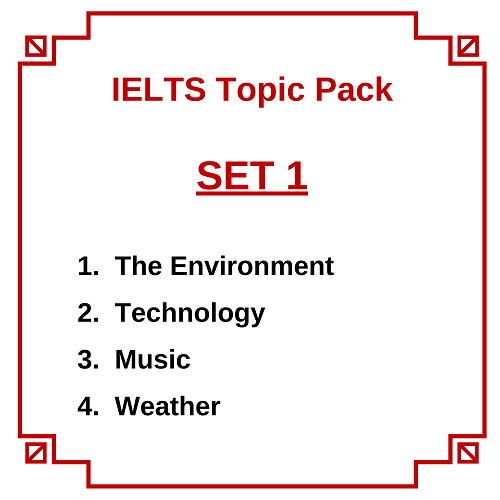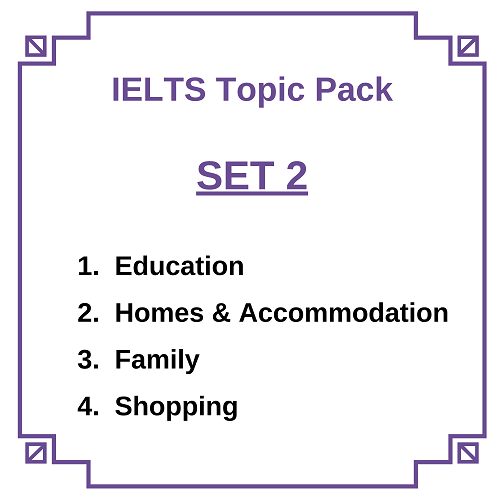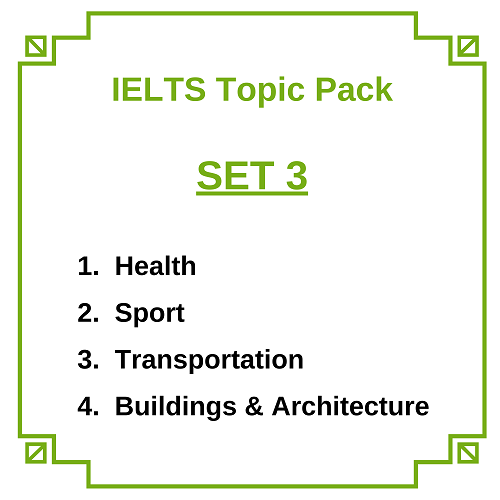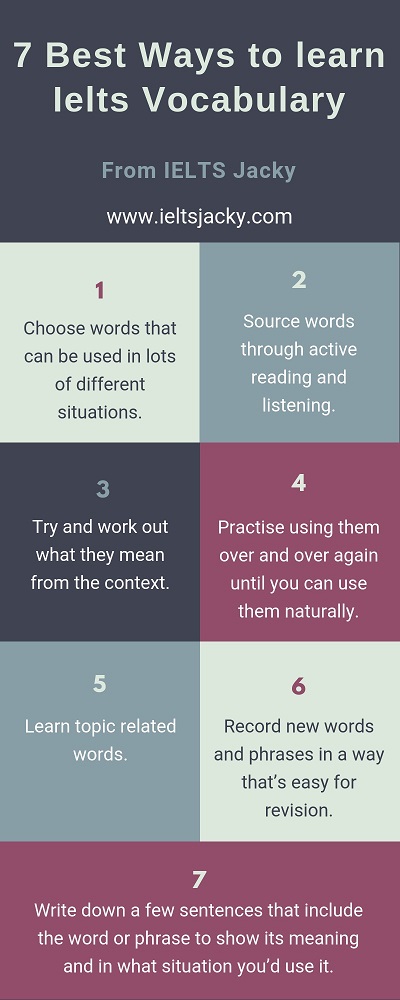How to Learn Vocabulary for IELTS
Learning vocabulary for IELTS isn’t just about learning new words and phrases, but about how you use vocabulary to develop good answers.
So this page is about how to develop a broad vocabulary but, more importantly, how to really master the vocabulary you choose to learn so that you can use it effectively.
To discover which words and phrases you should focus on, read this page:
IELTS Vocabulary – Top 6 Types of Vocabulary & Topic Word Lists
How To Learn Vocabulary for IELTS ‘Properly’
Why do I include the word ‘properly’ in this title?
Many people waste a whole load of their study time learning lists of words in the hope that they’ll be able to force them into their answers and impress the examiner. If that’s your approach, I’m afraid the examiner will be far from impressed.
This is completely the wrong way to go about improving your vocabulary so please don’t be one of these people because there is a better way. One that will save you time and be far more effective.
Firstly, you need to learn words in context. This means learning them within sentences so that you fully understand the meaning and how they are used. This is why I usually include a sentence containing any word or phrase I use as an example.
You probably noticed that the other page I’ve just recommended that you read promises you ‘topic word lists’. No, I’m not contradicting myself. There’s nothing wrong with using word lists as a resource, especially lists containing words and phrases related to common IELTS topics. Just don’t try learning them off by heart.
I’ve created the topic lists to save you time in researching the topics and having to look up the meaning of less common words and phrases.
They will make it quick and easy for you to practice using the vocabulary which will help you to learn it. I’ve included practice questions to help you here too.
Topic Vocabulary for IELTS
However, the main purpose of this page is to show you how to record vocabulary. If you do this effectively, you will know a word 100% and be able to use it in many different situations.
Before I illustrate exactly how to do this, here is a brief outline of the top ‘do’s’ and ‘don’ts of learning vocabulary for IELTS.
Top Do’s & Don’ts of Learning Vocabulary for IELTS
Don’t:
- Learn lists of words.
Do:
- Choose words that can be used in lots of different situations.
- Source words through active reading and listening.
- Try and work out what they mean from the context.
- Practice using them over and over again until you can use them naturally.
- Learn topic-related words.
- Record new words and phrases in a way that’s easy for revision.
Active reading and listening
An excellent way to source new vocabulary is through active reading and listening which should be part of your regular study routine. By active reading and listening I mean, paying close attention to what you’re reading or what’s being said and focusing on what you can learn from it.
Look out for words or phrases you don’t fully understand. Write them down. If possible, go back and read or listen to them again and see if you can work out what they mean in the context in which they’re written or spoken.
See if you can guess what the word means from the context. Read or listen 4 or 5 times if you need to until you think you’ve got it. Then look it up to check. It really is worth the time and effort as it will help you to understand the new vocabulary and how it’s used. You’re also more likely to remember and internalise it by doing this.
Recording Vocabulary for IELTS
Buy yourself a notebook, a thick one, and record any new words or phrases. A loose leaf system that you can add pages to works well, especially if you decide to add new vocabulary in alphabetical order. You could also organise your notebook by grammar tense or form. Do what works best for you.
The main thing is that you can locate a word or phrase you want to revise or review easily.
There are a number of things you should record in your notebook.
- Meaning
- Pronunciation
- Synonyms
- Collocations
- Grammar – the tense or grammatical structure of the word or phrase
There are more things you could add but you these 5 are a must. If you don’t know them then you don’t know the word properly, that is, 100%, and you probably aren’t ready to use it in your exam.
If you do have this level of understanding about a word, it will become a powerful and versatile tool that you’ll potentially be able to use in answers to a range of different questions in both the Speaking and Writing tests.
Make sure that you jot down a few sentences that include the word or phrase to show its meaning and in what situation you’d use it.
If you learn just five new words every day for five days a week, you will add nearly 100 new words to your vocabulary each month. That’s at least 500 new words every 6 months.
If that’s too much for you to manage, cut it down to a couple of words a day. It’s better to know fewer words really well than to have a vast vocabulary that you can’t use correctly as this approach will cost you valuable marks in your IELTS exam.
Review the new words regularly and practice using them in sentences.
Example of How to Record Vocabulary for IELTS
Here’s an example of how you could set out a new word you are learning.
You should find all the information you need about your new word or phrase in a good learner’s English dictionary and there are, of course, plenty of dictionary resources online.
I find the Cambridge online dictionary particularly useful. Like most online dictionaries, it has a button you can click to hear the pronunciation of the word. This is hugely helpful and something to make good use of when learning vocabulary for IELTS.
The word I’m going to use to demonstrate my recommended system of recording is ‘problem’.
problem
noun /ˈprɒb.ləm/
– a situation, person or things considered to be unwelcome or harmful and needing to be dealt with, overcome or solved.
- I’m having a problem with my car
- The problem of how to dispose of waste plastic has become a major global concern.
Synonyms:
- issue
- dilemma
- difficulty
- predicament
Collocations:
pose a problem – His unhealthy lifestyle will almost certainly pose a problem in the future.
fraught with problems – We had to abandon the project as it was fraught with problems.
raise a problem – The mood in the meeting was positive until Ned raised the problem of the shortfall in the pension fund.
address a problem – Cilla was fed up with being overweight. It was time to address the problem and find a diet and fitness regime that would work for her.
scale of the problem – Juan knew that a few of his staff were unhappy with the new rotas but hadn’t realised the scale of the problem. Now ten were threatening to leave.
If you look on the Cambridge online dictionary page for the word ‘problem’, you’ll see more information than I’ve recorded here. In common with many other words in the English language, it has several different meanings.
With this word, or any other, you don’t need to record or learn absolutely every way you could use it, just those ways that are going to be most useful for your test.
What else should you record?
Two other things you’ll probably want to record, depending on the word, are antonyms and idioms.
Antonyms:
- solution
- benefit
- advantage
- blessing
Idioms:
- root of the problem – the underlying cause or basis of a problem.
- We can’t start working on a solution until we get to the root of the problem.
- teething problems – short-term problems that occur in the early stages of a new project or situation.
-
Although the new design is now in full production, there were some teething
problems with the manufacturing process.
To discover why synonyms, antonyms and idiomatic language are so important, and to fully understand what they are if you’re uncertain, go to this other important page on vocabulary for IELTS that I’ve already recommended that you read.
IELTS Vocabulary – Top 6 Types of Vocabulary & Topic Word Lists
For many words, you won’t have nearly as much information to record as for others as they just don’t have all these variations or forms of use.
The key thing to remember when recording vocabulary for IELTS is to only to select the information that is likely to be really useful for your exam.
Be Patient
Take your time learning new words. It will take a long time to develop your vocabulary, so be patient and keep working away at it. The average person can learn between 5 and 10 words a day. But it’s better to learn 5 properly than 10 only partially.
And you MUST, MUST, MUST practice using the new words and phrases. Get out of your comfort zone and risk making mistakes. Mistakes can be corrected. Not using new vocabulary makes learning it a complete waste of time.
It’s only by learning how to use it appropriately and correctly that it actually becomes useful.
Final Thoughts for your IELTS Exam
- You are bound to make mistakes.
- The examiner isn’t
looking for perfection.
- They want to know what you can do well, not what you haven’t totally mastered.
- Using vocabulary incorrectly will affect your coherence and could lose you marks for this.
- Use what you know and use it well.
Want to watch and listen to the main information on this page?
Click on this video.
Topic Vocabulary For IELTS
All Vocabulary Lessons
How to Learn IELTS Vocabulary – Discover the 7 best ways to learn vocabulary for IELTS & avoid the big mistake most people make.
Key IELTS Vocabulary – 6 key types of vocabulary and why you need to learn them. Save hours of work and get more marks.
Vocabulary for Academic Task 1 Essays – Learn key vocabulary for a high-scoring essay. Word lists & a downloadable PDF.
Letter Writing Vocabulary – Learn useful phrases to help you achieve a high score. Also, know how to start & end your letter.
Listening Test - Problem Vocabulary – 8 listening exercises to help you recognise & learn problem vocabulary – time, numbers, prices, dates, letter names & addresses.
Listening Test - Map & Plan Vocabulary – Learn essential vocabulary of location & direction.





